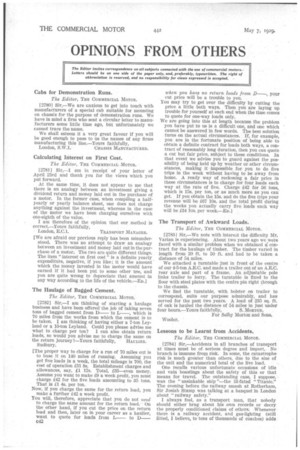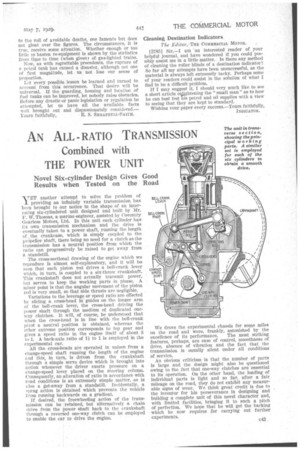OPINIONS FROM OTHERS
Page 74

Page 75

If you've noticed an error in this article please click here to report it so we can fix it.
L The Editor invites correspondence on all subjects connected with the use of commercial motors.• Letters should be on one side of the paper only, and, preferably, typewritten. The right of abbreviation is reserved, and no responsibility for views expressed is accepted.
Cabs for Demonstration Runs.
The Editor, THE COMMERCIAL MOTOR.
[2780] Sir,—We are anxious to get into touch with manufacturers of a special cab suitable for mounting on chassis for the purpose of demonstration runs. We have in mind a firm who sent a circular letter to manufacturers some little time ago, but unfortunately we cannot trace the name.
We shall esteem it a very great favour if you will be good enough to pass to us the names of any firms manufacturing this line.—Yours faithfully, London, S.W.1. CHASSIS MANUFACTURER.
Calculating Interest on First Cost.
The Editor, THE COMMERCIAL MOTOR.
[2781] Sir,—I am in receipt of your letter of April 23rd and thank you for the views which you put forward.
At the same time, it does not appear to me that there is an analogy between an investment giving a dividend return and money laid out in the purchase of a motor. In the former case, when compiling a halfyearly or yearly balance sheet, one does not charge anything against the investment, whereas in the case of the motor we have been charging ourselves with one-eighth of the value.
I am therefore of the opinion that our method is correct. —Yours faithfully, London, E.C.1. TRANSPORT MANAGER.
[We are afraid our previous reply has been misunderstood. There was no attempt to draw an analogy between an investment and money laid out in the purchase of a motor. The two are quite different things. The item "interest on first cost" is a definite yearly expenditure, negative, if you like; it is the amount which the money invested in the motor would have earned if it had been put to some other use, and you are quite wrong to depreciate that amount in any way according to the life of the vehicle.—En.] The Haulage of Bagged Cement.
The Editor, THE COMMERCIAL MOTOR.
[2782] Sir,—I am thinking of starting a haulage business and have been offered the job of taking seven tons of bagged cement from D— to L—, which is 70 miles from the works from which the cement is to be taken. I am thinking of having either a 7-ton Leyland or a 10-ton Leyland. Could you please advise me what to charge per ton? I can also obtain return loads, so would you advise me to charge the same on the return journey ?—Yours faithfully, HAULIER. Sudbury.
[The proper way to charge for a run of 70 miles out is to base it on 140 miles of running. Assuming you get five loads in a week, the total mileage is 700, the cost of operation £31 8s. Establishment charges and allowances, say, £1 12s. Total, £33—even money. Assume you want to make £9 a week profit, you must charge £42 for the five loads amounting to 35 tons. That is £1 4s. per ton.
Now, if you charge the same for the return load, you make a further £42 a week profit.
You will, therefore, appreciate that you do not need to charge the same amount for the return load. On the other hand, if you cut the price on the return load and then, later on in your career as a haulier, want to quote for loads from L— to D— c42 when you have no return, loads from D—, your cut price will be a trouble to you.
You may try to get over the difficulty by cutting the price a little both ways. Then you are laying up trouble for yourself at each end when the time comes to quote for one-way loads only.
We are going into this at length because the problem you have put to us is a difficult one, and one which cannot be answered in few words. The best solution turns on the actual circumstances. If, for example, you are in the fortunate position of being able to obtain a definite contract for loads both ways, a contract of reasonably long duration, then you can quote a cut but fair price, subject to these conditions. In that event we advise you to guard against the possibility of being held up by weather or other circumstances, making it impossible for you to do five trips in the week without having to be away from home. A ready way of reckoning a fair price in these circumstances is to charge for four loads each way at the rate of five. Charge £42 for 56 tons, which is 15s. per ton, or as much more as you can get. If you obtain the 15s. and do the five trips your revenue will be £67 10s. and the total profit during the weeks you actually carry five loads each way will be £34 10s. per week.—En.] The Transport of Awkward Loads.
The Editor, THE COMMERCIAL MOTOR.
[27831 Sir,—We note with intereat the difficulty Mr. Varian is experiencing. About two years ago we were faced with a similar problem when we obtained a: contract for the haulage of timber. The timber varied in length from 20 ft. to 50 ft. and had to be taken a distance of 54 miles.
We attached a turntable just in front of the centre of our 4-5-ton A.E.C. and made a trailer out of an A.E.C. rear axle and part of a frame. An adjustable pole links trailer to lorry. The turntable is fixed to the floor with steel plates with the centre pin right through to the chassis.
We find the turntable, with bolster on trailer to correspond, suits our purpose admirably, and has served for the past two years. A load of 235 sq. ft. of oak is hauled the distance of 54 miles in just under four hours.—Yours faithfully, S. MORTON, For Selby Morton and Sons.
Woolen
Lessons to be Learnt from Accidents.
The Editor, THE COMMERCIAL MOTOR.
[2784] Sir,—Accidents in all branches of transport at times must be of serious degree and import. No branch is immune from risk. In some, the catastrophe risk is much greater than others, due to the size of the unit and the numerical total of the live load.
One recalls various unfortunate occasions of idle and vain boastings about the safety of this or that means for travel. The outstanding case, I suppose, was the "unsinkable ship "—the ill-fated "Titanic." The evening before the railway smash at Rotherham, Sir Josiah Stamp was talking at a banquet in London about "railway safety."
I always feel, as a transport man, that nobody should either brag about his own records or decry the properly conditioned claims of others. Whenever there is a railway accident, and gas-lighting (still fitted, I believe, to tens of thousands of coaches) adds
to the roll of avoidable deaths, one laments but does not gloat . over the figures. The circumstances, it is true, receive some attention. Whether enough or too little to hasten re-equipment is shown by the statistics from time to time (when given) of. gas-lighted trains.
Now, as with regrettable precedents, the rupture of a petrol tank has caused a disaster, although not one of first magnitude, let us not .lose our sense of proportion.
Let every possible lesson be learned and turned to account from this occurrence. That desire will be universal. If the guarding, housing and location of fuel tanks can be improved, let nobody raise obstacles. Before any drastic or panic legislation or regulation be attempted, let us have all the -available facts well brought out and dispassionately considered.—
Yours faithfully, E. S. SIIRAPNELL-S ITIT.
Cleaning Destination Indicators
The Editor, TETE COMMERCIAL MOTOR.
[2185] am an interested reader of your helpful journal, and have wondered if you could possibly assist me in a little matter. Is there any method of cleaning the roller blinds of a destination indicator? So far all my attempts have been unsuccessful, as the material is always left extremely tacky. Perhaps some of your readers could assist in the solution of what I find to be a difficult problem.
If I may suggest it, I should very much like to see a short article e4li,ghtening the "small man" as to how he can best test his petrol and oil supplies with a view to seeing that they are kept to standard. Wishing your paper every success.—Yours faithfully, INDICATOR.






























































































































